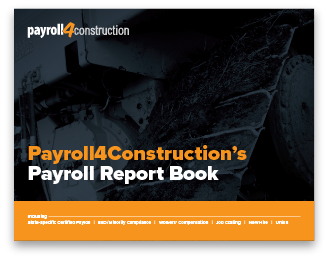
by Alex Gray
October 1, 2025
State minimum wage laws evolve constantly and create compliance challenges for construction contractors nationwide.
Whether you’re operating in Michigan, California, New York or any other state with complex wage requirements, staying current with regulatory changes is essential for protecting your business and maintaining profitability.
To illustrate how these changes can impact construction operations, let’s examine Michigan’s minimum wage updates from 2024.
While each state approaches wage law differently, Michigan’s experience demonstrates the types of challenges contractors face when navigating regulatory updates. This learning experience can also help create new strategies needed to maintain construction payroll compliance.
Related: Payroll4Construction helps Michigan contractors manage prevailing wage and certified payroll.
Key Takeaways:
- State minimum wage laws change rate structures, increase enforcement and add compliance requirements for contractors
- States use stricter audit protocols and higher penalties to enforce minimum wage compliance
- State minimum wage updates expand overtime and break requirements, often going beyond federal standards
- States require enhanced record-keeping standards with detailed payroll documentation for compliance
- Prevailing wage requirements add compliance layers when combined with state minimum wage provisions

Understanding Rate Structure Changes
State wage frameworks are becoming increasingly complex, often introducing tiered systems that replace straightforward approaches.
Michigan’s experience shows how these changes affect multiple worker categories and create new compliance obligations for construction employers.
Standard Minimum Wage Modifications
In 2024, Michigan increased its standard rate to $10.33 per hour. More significantly, the state implemented automatic wage increases tied to inflation.
This means wages now rise automatically each year based on economic indicators, eliminating the previous system where wage increases required legislative approval and often faced political delays.
This automatic escalation approach is being adopted by many states across the country, creating a new reality where contractors must plan for predictable annual wage increases rather than sporadic legislative changes.
Youth Worker Provisions
Michigan revised its youth worker provisions in 2024, setting the rate for workers under 18 at $8.78 per hour (85% of the standard minimum wage). The state expanded coverage requirements and clarified which positions qualify for the youth rate.
While construction companies don’t typically employ workers under 18 due to safety regulations and insurance requirements, contractors working on mixed-use projects or partnering with vocational programs should understand these provisions.
While specific rates and structures vary by state, many jurisdictions are adopting similar provisions for youth workers. These trends represent broader shifts in how states approach wage policy that contractors should monitor regardless of their primary operating locations.
Training Wage Provisions
The most significant change for construction companies usually involves training wage requirements.
Michigan, for example, expanded who qualifies for reduced training rates while simultaneously tightening documentation requirements for claiming these exceptions.
Companies bringing on new apprentices must now maintain detailed training records to justify using lower training wages. This includes:
- Formal apprenticeship program enrollment documentation
- Training milestone tracking
- Supervisor verification of skill development progress
- Regular assessment records
This trend is appearing across multiple states as governments increase oversight of worker classification practices.
Construction contractors should expect similar training documentation requirements to spread to other jurisdictions, making robust record-keeping systems essential for managing apprentice programs cost-effectively.
Enhanced Enforcement Strategies
States nationwide are modernizing their wage law enforcement approaches, with Michigan’s 2024 enforcement overhaul serving as a prime example.
The Department of Labor restructured audit processes and dramatically increased both inspection frequency and violation penalties.
These changes represent significant shifts in how states approach wage and hour compliance, with broader authority for investigators and substantially higher penalties for violations.
Modern Audit Procedures

The new audit framework gives state investigators broader authority to examine payroll records, interview employees and conduct surprise workplace inspections.
Construction sites now face potential unannounced visits. Investigators are empowered to halt work where they identify serious violations.
Documentation requirements expanded beyond basic payroll records to include:
- Detailed time tracking
- Break period logs
- Worker classification justifications
States can now demand electronic access to payroll systems and require contractors to maintain records in formats that facilitate digital auditing.
These enforcement trends are appearing across multiple states as governments modernize their compliance monitoring capabilities. Contractors should prepare for similar requirements regardless of their current state’s approach.
Penalty Structures
Penalty increases for wage violations are becoming a nationwide trend, affecting contractors in all states regardless of their current local requirements. Understanding these escalating consequences helps construction companies recognize the importance of proactive compliance measures.
Michigan dramatically increased violation penalties in 2024, with significant implications for contractors nationwide.
First-time offenders now face fines reaching $10,000 per affected employee. Repeat offender provisions include potential criminal charges for willful violations and automatic disqualification from state contracting opportunities.
These penalty increases reflect a broader trend toward more aggressive enforcement across states.
Back pay calculations now include liquidated damages and interest charges that compound over time. States can pursue collection through wage garnishment, asset seizure and liens against business property.
The financial impact of violations has become severe enough to threaten business viability, making proactive compliance essential rather than optional.
Federal and State Wage Law Coordination
The relationship between minimum wage laws and prevailing wage requirements creates complex compliance challenges for contractors working on government-funded projects.
Understanding how these systems interact is crucial for accurate bidding and payroll management.
In Michigan, state-funded construction projects over $50,000 must navigate both minimum wage compliance and prevailing wage requirements simultaneously.
Some classifications require contractors to pay the higher of either the prevailing rate or enhanced minimum wage calculations that include benefit provisions.
Davis-Bacon Act compliance intersects with state minimum wage provisions and creates unexpected obligations for contractors.
Federal projects must meet both federal prevailing wage requirements and state minimum wage standards, with contractors responsible for calculating which rates apply to different aspects of their operations.
Record-Keeping and Documentation Updates
Enhanced documentation standards create one of the most operationally challenging aspects of modern wage law changes. States now require more detailed record-keeping that goes beyond traditional payroll documentation.
Payroll record requirements expanded to include detailed job classifications, project-specific wage rates and time allocation tracking. These changes apply to workers who move between different types of projects, requiring companies to maintain records demonstrating compliance with multiple rate structures.
Time tracking systems must now capture break periods, overtime calculations and project-specific work classifications in greater detail. States require electronic systems that can generate compliance reports and provide audit trails for wage payments and deductions.
Digital record-keeping systems have become essential for contractors wanting to manage compliance efficiently. Automated systems that can track multiple rate structures, generate required reports and maintain detailed documentation standards help contractors maintain compliance while streamlining operations.

Prepare for Ongoing Changes With Payroll4Construction
State wage law evolution continues with automatic escalation provisions, meaning wage rates will continue climbing annually. This requires ongoing attention to compliance requirements and cost management strategies across all operating locations.
Contractors should invest in flexible processes and technological solutions that can adapt to regulatory changes without requiring complete operational overhauls.
Payroll4Construction specializes in helping construction contractors navigate complex wage law changes across all states while maintaining operational efficiency.
The services automatically update rate structures, track multi-project processing and store detailed documentation for enforcement protocols — regardless of which states implement new requirements.
Whether you’re dealing with Michigan’s minimum wage updates or any other state’s evolving wage laws, having the right compliance partner makes the difference between smooth operations and costly violations.
Book a demo to see how specialized payroll services can transform your approach to wage law compliance and protect your business from costly violations across all your operating locations.
Share Article
Keep on current news in the construction industry. Subscribe to free eNews!

